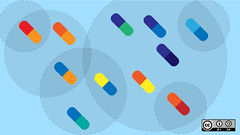Science, Brain | featured news
More Facebook friends linked to bigger brain areas
Senh: This doesn't mean that people with more Facebook friends are smarter than the rest of the population. It's the part of the brain that deals with social interaction. It also doesn't mean that if you add more friends, that area of the brain will grow bigger. They can't tell yet. All they could tell is that area of the brain is bigger for people with a lot of Facebook friends.





